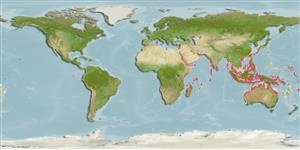Preferred temperature (Ref.
115969): 25.2 - 29.3, mean 28.5 (based on 3352 cells).
Phylogenetic diversity index (Ref.
82804): PD
50 = 0.5000 [Uniqueness, from 0.5 = low to 2.0 = high].
Bayesian length-weight: a=0.01096 (0.00698 - 0.01722), b=3.09 (2.96 - 3.22), in cm Total Length, based on LWR estimates for this species & Genus-body shape (Ref.
93245).
Trophic level (Ref.
69278): 2.7 ±0.24 se; based on food items.
Resilience (Ref.
120179): High, minimum population doubling time less than 15 months (Preliminary K or Fecundity.).
Prior r = 1.19, 95% CL = 0.79 - 1.79, Based on 1 data-limited stock assessment.
Fishing Vulnerability (Ref.
59153): Low vulnerability (20 of 100).
Climate Vulnerability (Ref.
125649): High vulnerability (63 of 100).
